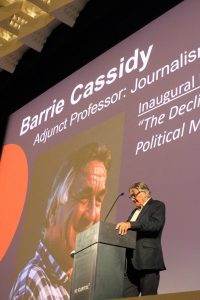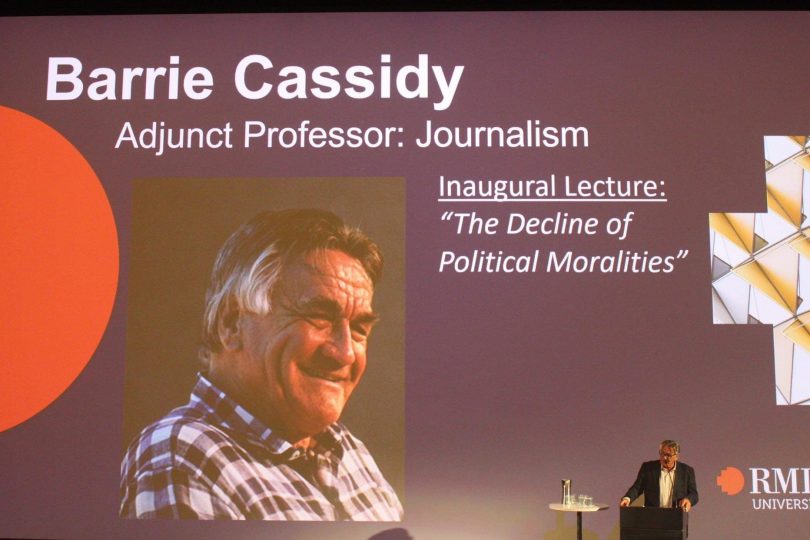What if he hadn’t been raised a country boy in the small town of Chiltern? What if he hadn’t dropped out of school after Year 10? What if he had gotten that job at the bank or the shoe shop in Albury? Would we have ever heard the name Barrie Cassidy?
Today, he’s described by former ABC colleague Michael Rowland having “one of the strongest work ethics of anybody I know”.
Rowland also told a room full of RMIT journalism students, staff and members of the public they would benefit from “Barrie’s wisdom, his extraordinary political knowledge and most importantly, his gold journalistic credibility”.
After the introduction, Barrie Cassidy took to the stage at the Capitol Theatre on Thursday night for his inaugural lecture as a newly appointed Adjunct Professor of RMIT Journalism.
“Given my background and education, it’s more than passing strange to be identified as professor. I didn’t meet a lot of those along the early journey,” Cassidy said.
After reflecting on the what-ifs of his past, Cassidy outlined the momentous career he has had since his days as a young boy, educated “exclusively by Presentation nuns”.
Cassidy has been a political correspondent, a press secretary for Bob Hawke, a foreign correspondent and most notably, the host of the ABC political discussion program Insiders.
“To me, the biggest single personal benefit from such a profession as journalism is the ongoing life training that it brings,” he said.
In his speech, Cassidy spoke of what he describes as “the decline of political morality” around the world.
Starting with Australia, he told the audience the Liberal Party has “shifted away from any pretence at centre-right government and towards the far-right”.
“The coalition can be seen now as the natural party of government in this country, and it will take something special to change that.”
By contrast, he puts the Labor Party’s shocking election loss down to an “agenda that was too ambitious”.
“In retrospect, Labor would have been better off running a far narrower campaign,” he said, suggesting its key policies should have tackled climate change and wages.
On climate change, Cassidy’s exasperation at our current political leaders’ response to the crisis (or lack of response) seemed evident.
“Quite frankly, this is the issue that kids, and everybody else, should be anxious about,” he said in response to Prime Minister Scott Morrison’s comments about “needless anxiety”.
“This is not a time for our leaders to wear rose-coloured glasses,” he said.
In the United States, Cassidy said democracy was under threat from Donald Trump’s “constant abuse of power and the improper use of executive privilege”.
“The standard of political discourse has never been lower, and decency in high office no longer seems to matter, or at least indecency seemingly has no consequences,” he said.
While Cassidy condemned Scott Morrison’s associations with Trump, he believed that the president would retain office due to the rise in political conservatism and the far right.
After many other comments and observations, including about politics in China and Britain, Barrie Cassidy ended his lecture by turning to the journalists and future journalists in the room.
He believed that political progress in those countries of which we focus on “will, as always, be at the hands of the media”.
“It’s the media’s responsibility to call out nonsense when they see it, to distil the dishonest rhetoric from the debate, and to try to put the shrill accusations from all sides into perspective … not contribute to that process,” he said.
Upon retirement as a full-time journalist, Cassidy’s next role will be as Adjunct Professor of RMIT Journalism, where he will be “sharing those twists and turns” of politics with RMIT students and imparting his wisdom and experience onto the young journos of the future.

Photo: Jacqueline Stanley






